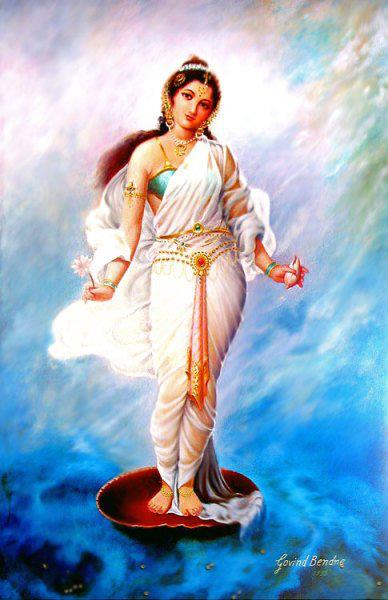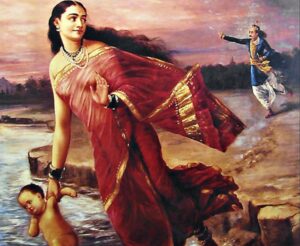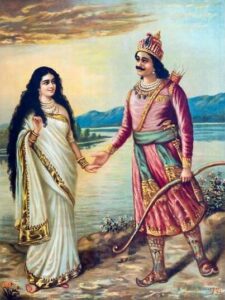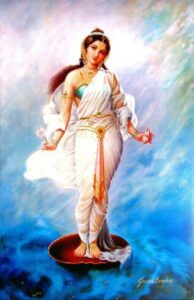

A Divine Introduction
I am Ganga, the sacred river goddess of Indian mythology. My waters are revered for their purity, and my journey on this earth has been marked by both grace and profound responsibility. Among the many tales associated with me, one story stands out—a tale of eight celestial beings, the Vasus, and the curse that bound them to human existence.
The Eight Sons: A Heavenly Origin
In the heavenly realms, there existed eight divine beings known as the Vasus. These celestial beings, named Dhara, Dhruva, Soma, Aha, Anila, Anala, Pratyusha, and Prabhasa, were known for their power and divine duties. Yet, a single moment of folly changed their destinies forever.
The Fateful Visit to Rishi Vashistha
One day, the Vasus, accompanied by their wives, visited the revered sage Rishi Vashistha. During their stay, something unexpected happened. The wives of the Vasus, enchanted by the beauty and divine aura of Vashistha’s cow, Nandini, urged their husbands to take the cow with them.
A Rash Act and a Sage’s Curse
Succumbing to their wives’ desires, the Vasus decided to steal Nandini. This action enraged Rishi Vashistha, who, in his fury, cursed the Vasus. He decreed that they would be born as humans and suffer the trials and tribulations of human life. This curse was not just a punishment; it was a sentence to experience the pain and suffering that only mortals know.
The Plea for Mercy
As the reality of the curse sank in, the Vasus were terrified. They had never known the burden of human suffering and were desperate to avoid it. Seven of the Vasus, except Prabhasa, fell at Rishi Vashistha’s feet, begging for mercy. Their tears and pleas moved the sage, but the curse had already been spoken and could not be entirely undone.
A Glimmer of Hope
While the curse could not be lifted, Vashistha’s heart softened. He made a concession: the seven Vasus who had sought his forgiveness would be freed from their human form shortly after birth. They would be spared the long years of suffering that awaited their eighth brother.
The Eighth Vasu: Prabhasa’s Defiance
Unlike his brothers, Prabhasa, the eighth Vasu, remained defiant. He had been the one to actually steal the cow, and perhaps it was pride or a sense of responsibility that kept him from pleading for mercy. As a result, Vashistha’s softened curse did not apply to him. Prabhasa would live a full life as a human, experiencing every joy and sorrow that came with it.
My Role: A Mother’s Sorrowful Duty
This is where I, Ganga, come into the story. The gods entrusted me with a heart-wrenching duty. I was to be the mother of these eight divine beings in their human forms. However, my task was not to nurture them but to relieve them of their curse. As soon as each of the seven Vasus was born, I had to release them from their earthly bonds by drowning them in my sacred waters.
The Sorrow of a Divine Mother
As a mother, even though I knew I was doing what was necessary, each act of drowning my sons was filled with immense sorrow. The weight of this duty was heavy, but I fulfilled it with the hope that I was liberating them from the suffering of human existence.
The Survival of the Eighth Son
The eighth son, Prabhasa, however, could not be freed from his curse so easily. He was destined to live a full life on earth. He would be known as Bhishma, one of the greatest warriors and most respected figures in Indian mythology. His life would be filled with challenges, but he would bear them with honor and strength.
Conclusion: The Tale That Shaped History
dear reader, is not just a myth but a reflection of the complexities of life, karma, and duty. As Ganga, I played a crucial role in shaping the destinies of these celestial beings. Through joy and sorrow, defiance and duty, this tale teaches us about the importance of responsibility and the consequences of our actions.
In the grand tapestry of Indian mythology, the tale of Ganga and the Vasus stands as a testament to the eternal truths of life. The river that flows through the heart of India carries with it the weight of ancient stories and the wisdom of the ages, reminding us that every action has its own ripple effect.
So, the next time you see a river flowing, think of the stories it might carry—stories of gods, humans, curses, and the eternal flow of life.
4o





